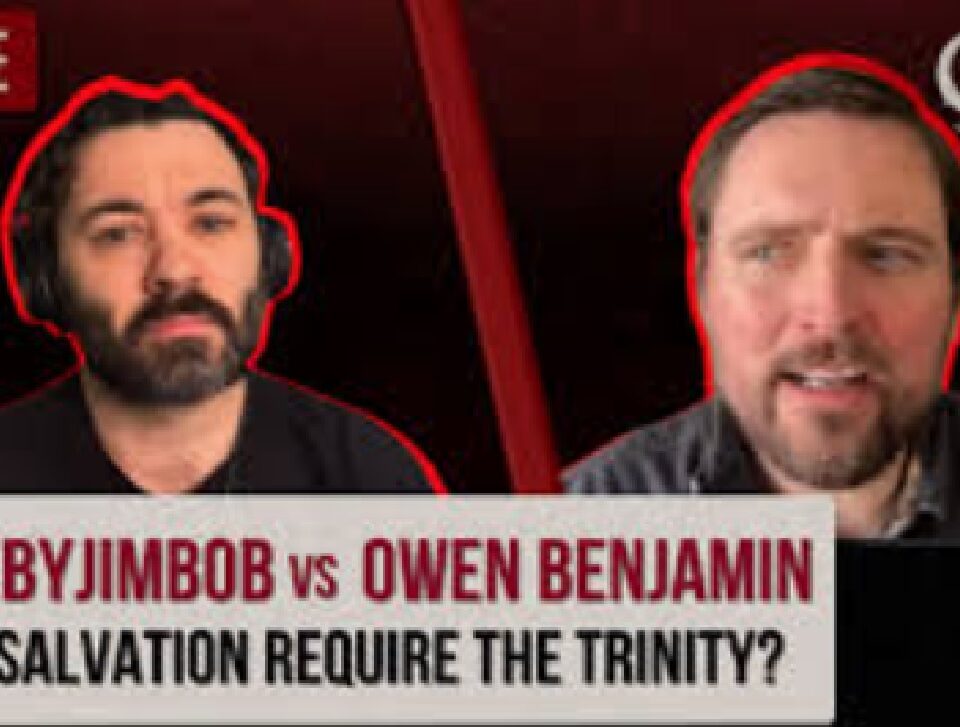
Church Fathers on created angels
April 11, 2025
The Nicene Creed Confusion
May 15, 2025Samuel Noble Important unitary doctrines

Version 1.0.0
Exerts from Important Doctrines of the True Christian Religion, 1848.
Notice the terms in which God himself commands us to acknowledge and worship him in the first commandment:
“I am the Lord thy God: thou shalt have no other gods before me.”
How is this to be understood upon the supposition of there being more Divine Persons than one, “in glory equal, in majesty co-eternal ?”
Are we (for this is the only way in which, upon such a supposition, the words can be understood at all: Are we) to conceive that all the three Persons are here speaking as it were with one mouth, so that when we are prohibited from worshipping any other gods, the meaning is, any others besides these three?
But how is this reconcilable with the use of the singular personal pronoun in both its cases—“I am the Lord thy God; thou shalt have no other gods before Me”?
What language was ever known, in which it was customary to speak of a plurality of persons as comprehended in the pronoun I?
The thought that there can here be any allusion to more Divine Persons than One, or that more persons than one could announce themselves by such a mode of speech, could never enter the conceptions of any unsophisticated mind.
Indeed, the same may be said of every instance in which the Lord solemnly communicates himself to his church, in this direct mode of address, throughout the Scriptures of the Old Testament: It is always “I the Lord,” that is, according to the original, “I Jehovan.”
Indeed, the name “Jehovah,” which is what the Lord constantly takes as his proper name, and which is the only proper name that he bears in the Old Testament, is a noun in the singular number; which would be a solecism indeed, unless applied to a Being of the most absolute indivisibility.
What can be more exclusive than the manner in which the nature of God, in regard to his Unity, is declared in the commandment which enforces the duty of loving Him above all things?
“Hear, O Israel,” says the inspired lawgiver; “the Lord thy God is One Lord.”
Is there any possible ambiguity such language as this?
If there were, would not the Lord as Christ, who in so many instances explains the true design of the Mosaic laws, have guarded against the misconception of things when a direct opportunity presented itself for his doing so?
And yet, when asked which was the first commandment of all, Mark relates the history, he repeated the very words of Moses, saying, “The first of all the commandments is, Hear, O Israel; Lord our God is one Lord; and thou shalt love the Lord thy God with all thy heart, and with all thy soul, and with all thy heart, and with all thy strength.”
Indeed, in the Greek of the New Testament recording the words of our Lord, the precept is if poossible less liable to misinterpretation than in the Hebrew of Moses.
For in the Hebrew, the word for God is here, again, Elohim, the form of which, whatever the sense may be, is plural, and on which some, as we have noticed, build an argument for the Trinity of Persons.
But this is given by the Lord, or by the evangelist writing by inspiration from Him, by the common Greek word for God—Theos; which, like the corresponding word in English, is in the singular number.
It were strange indeed, if the word Elohim really involved the mysterious meaning so gratuitously ascribed to it, that all trace of it should disappear on translating it into Greek.
Thus this passage, as given in the New Testament, affords so demonstrative a proof of the pure oneness of the Divine Being as is open to no evasion whatsoever.
The scribe, also, to whom these words were addressed by Jesus, repeated them after him, as we have read in our text, with more emphasis still:
“for he said unto him, Well, Master, thou hast said the truth: for there is one God, and there is none other but he:” and it is recorded of Jesus, that, so far from disapproving of this statement of the doctrine, He “saw that he answered discreetly.”
Indeed, this is the doctrine which is constantly taught by the Lord and his Apostles.
He said on another occasion, “There is none good but one, that is, God.”
Paul declares repeatedly that “there is one God:” and James says, “Thou believest that there is one God: thou doest well.”
The same great truth is also repeatedly propounded in the negative form.
Moses says to Israel, respecting the wonders wrought by the Lord in Egypt (Deut. iv. 34).
So Hannah says in her prayer, (1 Sam. i. 2,]
But with what majesty does Jehovah himself declare the same truth by his prophet Isaiah! [ch. xlv. 5, 6,14, 18, 21, 22:7].
Again, Isa xlvi. 9; xlii. 8; xliji. 10, 11.)
We have before seen that, according to the testimony of the Lord by this prophet, there is no participator in the divine counsels: so here See that there is no participator in the divine works, either of ation or of redemption.
Here is mention of the different offices which the Lord performs for his people; but no mention of a parcelling out of those offices among different Divine Persons.
Jehovah declares that he performs the whole-alone-by Myself; and this because He alone is the God of heaven and earth.
Can testimony be more express?
What subtitles can be devised to overthrow the evidence of such passages as these, and to make us conclude, that when God constantly declares that He is One, we are to interpret that One to mean Three?

